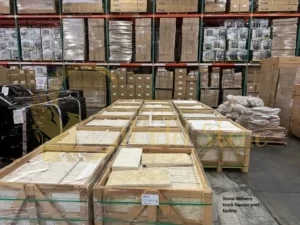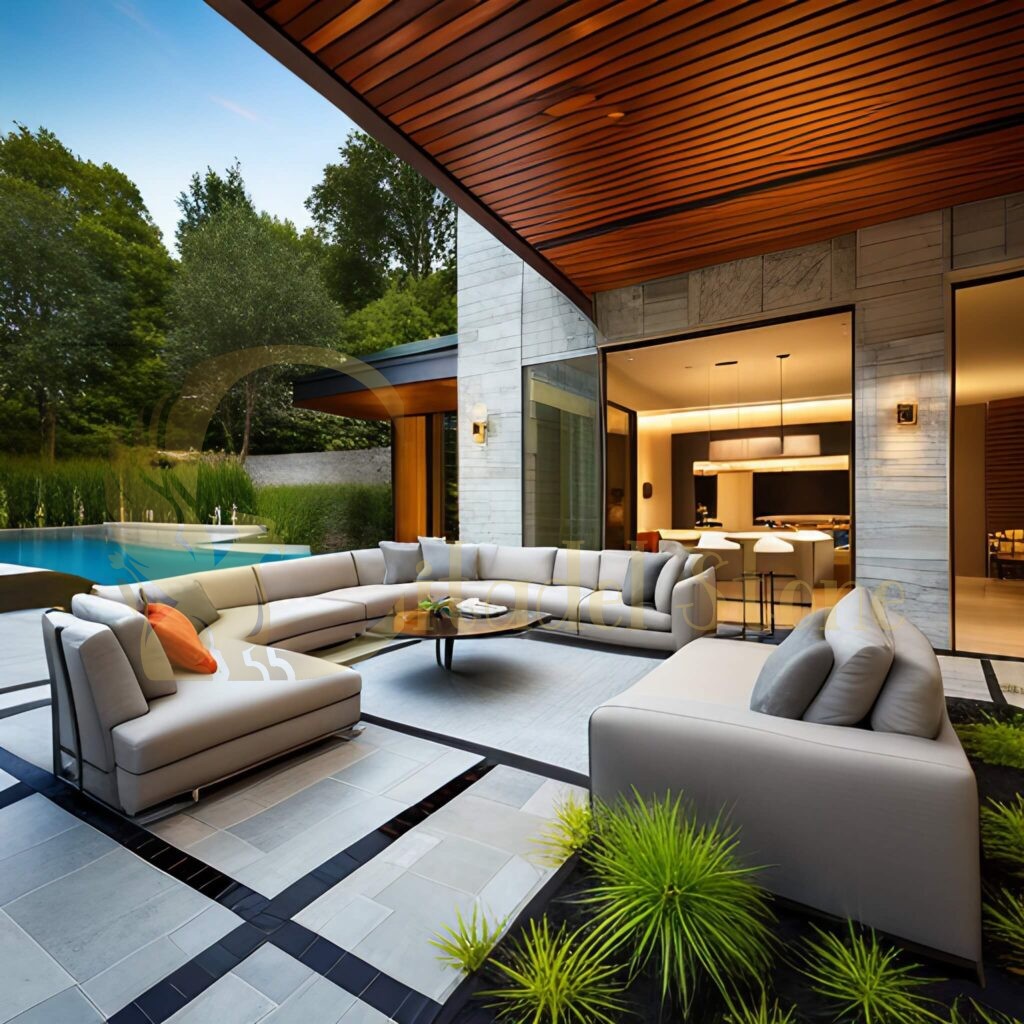This comprehensive guide examines both local Bahamian quarries and imported stone alternatives, helping you navigate pricing, logistics, and quality considerations specific to tropical climates. You’ll discover which materials thrive in salt-air environments and which suppliers consistently deliver on time to remote island locations.
The stakes are high in the Bahamas construction market. Projects often involve significant investment, and material failures can be catastrophic given the remote location and limited local resources. By the end of this guide, you’ll have the knowledge to select suppliers and materials that ensure project success in one of the world’s most challenging coastal environments. Transform Your Tropical Oasis with our backyard tiles Bahamas!
Local Quarries vs. Imported Stone
Advantages of Bahamian Quarries
Local Bahamian quarries offer compelling benefits that many contractors overlook. The most significant advantage is natural climate adaptation – stones quarried in the Bahamas have already withstood centuries of the exact conditions your project will face.
Proximity translates to substantial cost savings on freight. While imported stone can carry shipping costs of $15-25 per square foot, local materials eliminate these expenses entirely. This advantage becomes even more pronounced for large-volume projects where freight can represent 40-60% of total material costs.
Local sourcing also provides unmatched authenticity for heritage projects. Nassau’s historic district, for example, was built primarily with native limestone, and matching this material for renovations creates seamless integration that imported alternatives cannot achieve.
Response time is another critical factor. When you need additional material or face unexpected shortages, local quarries can often deliver within 24-48 hours. Compare this to imported stone lead times of 6-12 weeks, and the operational advantage becomes clear.
The primary local Bahamian quarries include Nassau Limestone Works, which has operated continuously since 1952, and Andros Stone Company, known for their distinctive coral limestone with superior salt resistance. Both maintain consistent quality standards and understand the specific requirements of Bahamian construction.
Benefits of Imported Materials
Imported stone opens access to materials impossible to source locally. Granite, marble, slate, and specialty stones like travertine expand your design palette significantly. For high-end resort projects, this variety often justifies the additional logistics complexity.
Technical performance sometimes favors imported options. Brazilian granite, for instance, offers superior hardness ratings (6-7 on Mohs scale) compared to local limestone (3-4 rating). For high-traffic applications like hotel lobbies or public walkways, this durability difference can extend project lifespan by decades.
Specialized finishes represent another imported stone advantage. While local quarries typically offer basic saw-cut or natural finishes, international suppliers provide options like thermal finishing for slip resistance, bush-hammering for texture, and precision honing for specific reflectivity levels.
Import logistics have improved dramatically in recent years. Established imported stone logistics Bahamas networks now provide reliable scheduling and quality control. Companies like Caribbean Stone Import and Bahamas Building Materials maintain warehouse facilities in Nassau and Freeport, reducing lead times for commonly requested materials.
Cost predictability often favors imports for premium projects. While freight adds expense, imported pricing remains stable across project timelines. Local quarry pricing can fluctuate based on extraction conditions and seasonal demand variations.
Explore Our Coastal-Inspired Driveway Paving Stones Bahamas Selection – Shop Now!
Cost & Lead-Time Comparison Chart
| Stone Type | Local Source | Imported Alternative | Price Difference | Lead Time Difference |
|---|---|---|---|---|
| Limestone | $8-12/sq ft | $18-25/sq ft | +125% | +8-10 weeks |
| Coral Stone | $10-15/sq ft | $22-30/sq ft | +120% | +6-8 weeks |
| Granite | Not available | $25-45/sq ft | N/A | 8-12 weeks |
| Marble | Not available | $35-65/sq ft | N/A | 10-14 weeks |
| Travertine | Not available | $20-35/sq ft | N/A | 6-10 weeks |
Prices include delivery to Nassau/Freeport. Remote islands add $3-8/sq ft.
Price Ranges & Delivery Logistics
Typical Price Bands (per sq ft or tonne)
Understanding stone price ranges Bahamas requires considering multiple cost components beyond the base material price. Local limestone typically ranges from $8-12 per square foot for standard thicknesses (1.25″), while premium coral stone commands $10-15 per square foot.
Imported materials show wider price variation. Entry-level granite starts around $25 per square foot, while exotic varieties can exceed $65 per square foot. Marble pricing ranges from $35-65 per square foot, depending on origin and rarity. Travertine offers a middle ground at $20-35 per square foot.
Volume significantly impacts pricing. Orders exceeding 1,000 square feet typically qualify for 10-15% discounts from local suppliers. Import pricing becomes more favorable above 2,000 square feet, where container-load economies offset freight disadvantages.
Thickness premiums apply universally. Standard 1.25″ material serves as the baseline, with 2″ thickness adding 40-50% to costs and 3″ material doubling base prices. Custom thickness requirements often necessitate special quarrying or fabrication, adding 25-75% premiums.
Finishing costs vary dramatically by complexity. Natural split faces incur no additional charges, while polished finishes add $3-6 per square foot. Specialty textures like bush-hammering or thermal finishing can add $8-15 per square foot to base pricing.
Request a Sample of Our Weather-Resistant Large Outdoor Tiles Bahamas!

Shipping Routes & Transit Times to Nassau, Freeport, Eleuthera
Stone delivery Nassau represents the most efficient logistics hub in the Bahamas. Nassau’s port facilities can accommodate large vessels, making it the primary entry point for imported materials. Most international shipments transit through Nassau before redistribution to other islands.
Freeport offers secondary import capabilities, particularly for materials originating from the US East Coast. Freeport stone suppliers often maintain inventory specifically for Grand Bahama projects, reducing lead times for local construction.
Inter-island shipping presents the greatest logistical challenge. Eleuthera, Abaco, and Exuma deliveries require barge transport from Nassau or Freeport, adding 3-7 days to schedules and $4-8 per square foot to costs. Weather delays can extend these timelines significantly during hurricane season (June-November).
Direct shipping to remote islands requires careful planning. Many smaller islands lack port facilities capable of handling stone deliveries, necessitating smaller vessels and manual offloading. These logistics can double or triple delivery costs while extending timelines by 2-3 weeks.
Air freight represents an emergency option for small quantities. Nassau and Freeport airports can handle stone shipments up to 2,000 pounds per flight, but costs often exceed $20 per pound, making this option viable only for samples or critical repairs.
Customs, Duties & Handling Fees
Bahamian customs procedures for stone materials remain relatively straightforward, but understanding the process prevents costly delays. Most natural stone imports qualify for reduced duty rates under construction material classifications, typically 10-15% of declared value.
Documentation requirements include commercial invoices, bills of lading, and certificates of origin. For premium materials exceeding $10,000 per shipment, additional documentation may be required, including detailed material specifications and quality certifications.
Handling fees at Nassau and Freeport ports range from $150-400 per container, depending on size and weight. These fees cover basic unloading and temporary storage but exclude delivery to final destinations. Extended port storage incurs additional daily charges of $25-50 per container.
Customs inspections occur randomly but increase in frequency for first-time importers or unusual material types. Inspection delays typically add 1-3 days to clearance times and may incur additional fees of $100-300 per inspection.
Bonded warehouse options exist in Nassau for contractors managing multiple projects. This arrangement allows duty-free storage of imported materials until needed, providing flexibility for project scheduling while reducing overall customs processing time.
Start Your Beachside Makeover – Browse Our Pavers Bahamas Options!
Quality Grades for Tropical Climates
Hardness Ratings & Abrasion Resistance
Tropical stone grades must withstand unique environmental stresses that rarely affect temperate climate installations. Hardness ratings provide the foundation for durability assessment, with the Mohs scale serving as the primary measurement standard.
For high-traffic applications like resort walkways or public plazas, minimum hardness ratings of 6-7 on the Mohs scale ensure adequate wear resistance. Granite consistently meets these requirements, while limestone typically rates 3-4, making it suitable only for low-traffic or protected applications.
Abrasion resistance testing becomes critical in salt-air environments where wind-borne particles create constant surface wear. The Taber Abrasion Test provides standardized measurements, with results below 10mm indicating excellent resistance and values above 25mm suggesting poor performance in exposed locations.
Thermal expansion characteristics affect tropical installations significantly. Daily temperature variations of 30-40°F combined with intense solar heating can cause material stress and eventual failure. Granite’s low thermal expansion coefficient (8.1 x 10^-6/°F) outperforms limestone (11.7 x 10^-6/°F) in these conditions.
Crystalline structure influences long-term durability in tropical climates. Dense, interlocking crystal matrices resist weathering better than porous or layered structures. This factor explains why certain imported granites outperform local limestone in exposed applications despite higher initial costs.
Porosity & Water Absorption Thresholds
Porosity for humid climates represents perhaps the most critical material characteristic in Bahamian applications. High humidity and frequent rain create constant moisture exposure that can devastate inappropriate materials through freeze-thaw cycles and salt crystallization.
Water absorption rates below 0.5% indicate excellent tropical performance, while rates exceeding 3% suggest problematic long-term durability. Most premium granites achieve 0.1-0.3% absorption, while limestone typically ranges from 2-8%, explaining the performance difference in coastal applications.
Pore size distribution affects durability more than total porosity. Large, interconnected pores allow rapid water movement and drying, while small, isolated pores trap moisture and promote deterioration. Capillary absorption testing reveals these characteristics more accurately than simple immersion tests.
Salt crystallization resistance becomes paramount in Bahamian installations. Sodium chloride crystals forming within stone pores create tremendous internal pressure, causing spalling and surface deterioration. Materials with absorption rates below 1% typically resist this damage effectively.
Differential porosity within single stone pieces can create maintenance challenges. Variable absorption rates cause uneven staining and weathering patterns that compromise aesthetic appeal over time. Quality suppliers provide absorption data for each material lot to ensure consistency.
Surface Finishes for Slip Resistance and UV Stability
Surface finish selection dramatically impacts both safety and longevity in tropical installations. Smooth, polished surfaces that showcase stone beauty in showrooms become hazardous when wet with tropical rain or pool splashing.
Slip resistance testing using ASTM C1028 provides objective safety measurements. Coefficient of friction values above 0.6 indicate adequate wet traction for most applications, while values below 0.4 suggest safety concerns requiring alternative finishes or treatments.
Thermal finishing creates excellent slip resistance while maintaining visual appeal. The flame treatment process removes softer minerals and creates micro-texture that provides traction without appearing rough or industrial. This finish particularly suits granite and certain dense limestone varieties.
Bush-hammering offers maximum slip resistance for high-risk areas like pool decks and ramps. The mechanical texturing process creates consistent, controllable surface roughness while preserving stone integrity. However, the increased surface area requires more frequent cleaning in salt-air environments.
UV stability affects color retention and surface integrity over time. Natural stone generally resists UV damage better than manufactured alternatives, but certain minerals can fade or shift color with prolonged exposure. Feldspathic stones show particular vulnerability to UV degradation in tropical climates.

Supplier Selection Checklist
Choosing reliable natural stone suppliers Bahamas requires systematic evaluation beyond basic pricing and availability. The remote location and challenging environment demand suppliers with proven local performance and comprehensive support capabilities.
- Local Project Portfolio: Review completed installations in similar climatic conditions, particularly coastal or marine environments within the Caribbean region.
- Quality Certifications: Verify ASTM testing compliance for absorption, hardness, and thermal properties specific to your application requirements.
- Inventory Management: Assess warehouse facilities and stock rotation practices to ensure fresh materials without prolonged tropical storage degradation.
- Logistics Capabilities: Evaluate shipping networks, handling equipment, and delivery scheduling flexibility for your specific island location.
- Technical Support: Confirm availability of installation guidance, sealing recommendations, and maintenance protocols for tropical conditions.
- Sample Availability: Ensure access to representative samples that reflect actual material characteristics rather than idealized showroom pieces.
- Insurance Coverage: Verify comprehensive liability and cargo insurance that covers material replacement and installation delays.
- Emergency Response: Assess ability to provide rapid replacement materials for unexpected shortages or damage during installation.
- Environmental Compliance: Confirm adherence to Bahamian environmental regulations and sustainable quarrying practices where applicable.
- Payment Terms: Evaluate financing options and payment schedules that accommodate project cash flow requirements and international transaction considerations.
PDF Download: “10 Questions to Ask Your Stone Supplier”
Download Your Free Supplier Evaluation Checklist
Selecting the right stone supplier can make or break your Bahamian project. Our comprehensive “10 Questions to Ask Your Stone Supplier” PDF provides a systematic approach to evaluating potential partners before committing to major material purchases.
This detailed checklist covers critical areas often overlooked during initial supplier discussions. From technical specifications and testing protocols to logistics capabilities and emergency support, these questions reveal supplier strengths and weaknesses that impact project success.
The PDF includes sample responses that indicate high-quality suppliers versus those requiring additional scrutiny. You’ll also find red flags to watch for during supplier meetings and contract negotiations.
Professional contractors across the Caribbean have used this checklist to avoid costly supplier mistakes and ensure reliable material delivery for projects ranging from private residences to major resort developments.
Download your copy today and approach your next supplier meeting with confidence, knowing you’re asking the right questions to protect your project investment.
Unlock Exclusive Deals on Exterior Tiles Bahamas Perfect for Island Living
Case Example: Nassau Resort Patio Installation
The Atlantis Paradise Island resort’s recent pool deck renovation illustrates the importance of proper stone selection and supplier coordination in challenging Bahamian conditions. The project required 3,500 square feet of slip-resistant stone for high-traffic pool areas exposed to constant moisture and salt spray.
Initial specifications called for local coral limestone with thermal finishing to provide slip resistance while maintaining visual harmony with existing architecture. However, early testing revealed absorption rates exceeding 4%, raising concerns about long-term durability in the chlorinated pool environment.
The development team pivoted to imported Brazilian granite with natural cleft finish, providing superior durability and slip resistance. While material costs increased 60%, the decision eliminated long-term maintenance concerns and potential liability issues from slip accidents.
Logistics coordination proved critical to project success. The supplier maintained a Nassau warehouse facility, allowing just-in-time delivery that minimized on-site storage requirements during the busy tourist season. Weather delays during installation were accommodated through flexible scheduling and backup material availability.
The installation’s success after two years of operation validates the supplier selection process and material specifications. The granite has maintained its appearance and slip resistance despite intense use and harsh environmental conditions, while comparable limestone installations elsewhere on the property show significant deterioration.
This case demonstrates how upfront investment in superior materials and reliable suppliers provides long-term value that justifies initial cost premiums, particularly in demanding tropical applications where replacement costs can be prohibitive.
Sustainability & Maintenance Tips
Eco-friendly Quarry Practices in the Bahamas
Sustainable quarrying practices increasingly influence supplier selection as environmental awareness grows among developers and government regulators. Local Bahamian quarries have implemented progressive restoration programs that transform exhausted quarries into beneficial community assets.
Nassau Limestone Works operates under strict environmental protocols that include progressive rehabilitation of quarried areas. Exhausted sections become freshwater reservoirs or recreational facilities, providing lasting community benefits beyond the initial economic activity.
Waste minimization programs reduce environmental impact while improving economic efficiency. Modern quarrying techniques achieve 85-90% material utilization compared to 60-70% rates from older operations. This improvement reduces landscape disruption while maximizing resource extraction from permitted areas.
Water management systems prevent contamination of freshwater aquifers critical to island communities. Closed-loop systems recycle processing water while settling ponds remove sediments before any discharge. These systems protect the delicate hydrological balance essential to sustainable island development.
Transportation efficiency reduces carbon footprints through optimized logistics. Local suppliers eliminate international shipping emissions while strategic warehouse locations minimize truck transport distances. For environmentally conscious projects, these factors can influence material selection significantly.
Certification programs like the Natural Stone Council’s sustainability standards provide objective measures of quarry environmental performance. Suppliers meeting these standards demonstrate commitment to responsible resource extraction that aligns with modern development values.
Sealing, Cleaning, and Upkeep in Salt-Air Environments
Maintenance requirements in salt-air environments exceed typical inland applications significantly. Proper sealing protocols can extend stone lifespan dramatically while reducing long-term maintenance costs and preserving aesthetic appeal.
Penetrating sealers provide superior protection compared to surface coatings in tropical climates. These products penetrate stone pores to resist moisture intrusion while allowing vapor transmission that prevents trapped moisture problems. Reapplication typically requires 3-5 year intervals depending on exposure conditions.
Cleaning protocols must address salt accumulation without damaging stone surfaces. Mild acid solutions effectively remove salt deposits but require careful pH control to prevent etching of calcium-based stones. Regular freshwater rinsing provides the best preventive maintenance for most installations.
Preventive maintenance schedules should increase frequency during peak salt exposure periods. Hurricane season brings increased salt spray that accelerates deterioration if not addressed promptly. Monthly inspection and cleaning during these periods prevents long-term damage accumulation.
Efflorescence management becomes critical in humid conditions where moisture movement through stone brings dissolved minerals to surfaces. Proper drainage design and vapor barriers reduce efflorescence occurrence, while specialized cleaners remove existing deposits without surface damage.
Professional maintenance services increasingly offer specialized tropical stone care programs. These services understand local conditions and provide cost-effective maintenance that extends material lifespan while preserving warranty coverage from suppliers and installers.
Real-World Success: Citadel Stone’s Transformative Projects Across the Bahamas
Nassau, Capital of the Bahamas
Why Natural Stone in Nassau?
High-end resorts & heritage buildings—from the Atlantis Mega-resort to Parliament House—demand stone with both beauty and durability.
Coralline limestone and Bahama Blue resist salt spray and tropical downpours.
Local quarries on New Providence produce creamy, fossil-rich limestones prized for façades and flooring.
Project Highlights
Atlantis Resort Façade
Supplied 3,500 m² of custom-cut Bahama Blue Limestone
Reduced lead time by 20% through streamlined fabrication
Mason Training Initiative
Hosted workshops for 25 local craftsmen on best practices in stone handling
Improved installation quality across multiple luxury developments
Community Partnership
Channelled 15% of quarry profits back into Nassau’s infrastructure projects
Freeport, Grand Bahama’s Commercial Hub
Market Challenges
Rapid tourism growth—from Port Lucaya to upscale villas—requires hurricane-resistant materials.
Stone must stand up to high winds and saline groundwater.
Project Highlights
Port Lucaya Boardwalk
Delivered 2,000 m² of CNC-precise coral-stone paving
Reduced onsite waste by 30% with precision cutting
Skills & Scholarships
Funded internships for three Bahamian youths at Citadel’s fabrication plant
Strengthened local workforce capacity
Sustainable Quarry Upgrades
Invested in water-recycling systems at Freeport quarries, cutting freshwater use by 40%
West End, Grand Bahama’s Historic Gateway
Local Needs
Residential renovations seek authentic reef coral to preserve colonial charm.
Marine applications (docks, small harbors) need stone tolerant of tidal flux.
Project Highlights
West End Villa Restoration
Supplied antique-finish reef coral blocks matching original textures
Achieved a 95% client satisfaction score for color match
Logistics Optimization
Coordinated barge transport from Freeport, reducing transit costs by 25%
Heritage Skills Transfer
Trained local artisans in dry-stack wall techniques to preserve traditional aesthetics
Coopers Town, Abaco’s Quiet Gem
Authenticity & Boutique Appeal
Abaco’s sand-bedded coral yields uniquely textured stone for boutique inns and galleries.
Hand-crafted materials are prized in fireplace surrounds and wall tiles.
Project Highlights
Pineapple Museum Restoration
Provided hand-split coral brick matching 19th-century textures
Damage Reduction
Developed custom crates, cutting shipping breakage from 15% to 4%
Local Employment
Hired five Coopers Town residents for on-site cutting and finishing
Marsh Harbour, Abaco’s Booming Seaport
Rebuild & Resilience
Post-storm rebuilds demand hurricane-proof materials.
Harbor upgrades require marine-grade stone to withstand saltwater erosion.
Project Highlights
Harbor Floodwall Project
Delivered 1,200 m³ of marine-grade coral stone, extending design life by 50 years
Emergency Response
Activated helicopter lift for 100 m³ of blocks after storm surge
Professional Development
Trained 30 local contractors in joint sealing and UV-protection methods
Freetown, New Providence’s Emerging District
Modern Luxury Meets Nature
Hillside residential developments and boutique commercial spaces require both style and resilience.
Stones must brighten interiors and resist intense sun exposure.
Project Highlights
Hillside Villa Development
Supplied 800 m² of precision-cut light-toned travertine, reducing installation time by 40%
Prefab Panel Program
Launched with local fabricators to deliver 50 wall modules per week
Environmental Stewardship
Donated 5% of project profits to a mangrove replanting initiative in nearby Fox Hill.
Elevate Your Island Home’s Curb Appeal with Stylish Stone Pavers Bahamas!
Conclusion & Next Steps
Successful natural stone selection in the Bahamas requires balancing multiple factors that mainland contractors rarely encounter. Climate challenges, logistics complexity, and limited local resources demand careful planning and supplier selection to ensure project success.
Key takeaways from this comprehensive guide include:
- Climate adaptation takes precedence over aesthetic preferences when selecting materials for exposed tropical applications
- Local suppliers offer significant advantages in logistics, authenticity, and emergency support despite limited material variety
- Import logistics have improved but still require extended lead times and careful customs planning
- Quality testing for tropical conditions must include absorption, hardness, and thermal expansion measurements
- Supplier evaluation should emphasize local experience, technical support, and emergency response capabilities
- Maintenance planning must account for salt-air exposure and increased cleaning requirements
The investment in proper material selection and reliable suppliers pays dividends throughout project lifecycles. While premium materials and established suppliers may increase initial costs, the long-term benefits in durability, maintenance, and performance justify these investments in demanding tropical environments.
Whether you’re planning a luxury resort development, historic renovation, or residential project, the principles outlined in this guide provide the foundation for successful stone selection and supplier partnerships in the unique Bahamian environment.
Ready to start your Bahamian stone project with confidence? Explore our Caribbean stone collection or contact our tropical climate specialists today. Our team understands the unique challenges of Bahamian construction and can guide you through material selection, logistics planning, and supplier coordination to ensure your project’s success.
Contact our Caribbean experts today for personalized consultation on your natural stone requirements. With decades of experience in tropical stone applications and established supplier networks throughout the Bahamas, we provide the expertise and support your project deserves.

